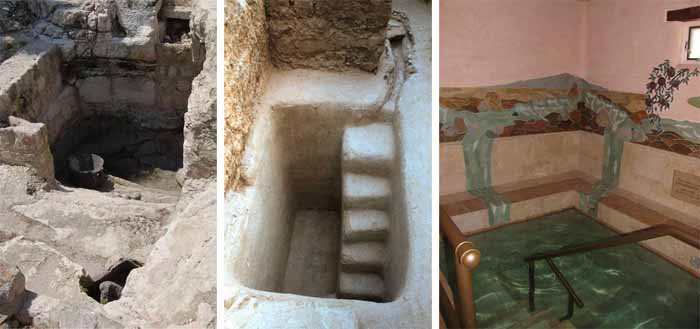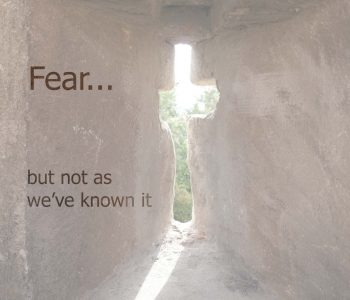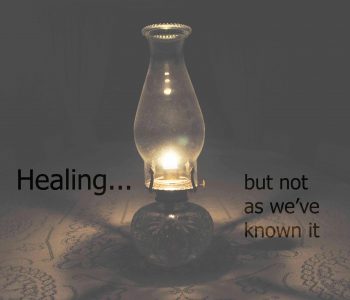 But Not As We've Known It
But Not As We've Known It
Baptism… but not as we’ve known it
Shortly after I put my testimony on Unveiling in February 2012, my parents visited us and my mother asked me, “Why did you not say anything about your baptism in your testimony?” I replied, “Because it was just another religious thing I did that I knew I was meant to do.”
She said, “But we didn’t tell you to do it, you wanted to be baptized…” and I agreed, saying, “Yes, because I knew very well what was expected of me as a good Christian, and I knew what you guys wanted me to do!”
When I was baptized as a teenager I certainly had all the head knowledge of what I was doing and why, and I was sure that God wanted me to be baptized, but the simple truth is that the act of baptism could not take me from death to Life! No ritual can bring about a spiritual result because a ritual is something WE do as opposed to something the Spirit of God does.
Then my mother said, “Didn’t Jesus say to baptize people in His name?”
Well, it is very debatable whether Jesus ever said that! “Go and make disciples of all ethnicities, baptizing them in the name of the Father and of the Son and of the Holy Spirit” (Matt. 28:19) is one of the most contested verses in the Bible. The second half of the sentence is believed to have been added much later. Some refuse to accept this because it is included in the Textus Receptus and baptism plays such a large role in church tradition. However, Matthew’s gospel was originally written in Hebrew and was translated into Greek much later. The Jews preserved several Hebrew versions (see links at the end) but these Hebrew texts were not used in the creation of the English Bible. Instead the Latin and Greek translations were used.
In one of these Hebrew versions this verse reads: “You go and teach them to carry out all the things that I have commanded you forever.” Some believe that the phrase about baptism was added by the “church fathers” into the Greek and Latin versions. “Conybeare is believed to have been the first to write against it, following the discovery of a variant reading of the verse, within the writings of Eusebius of Caesarea. Some 17 times in his works prior to Nicea, Eusebius quotes Matthew 28:19 as “Go and make disciples of all nations in my name” without mentioning the Trinity baptism command.” (Analysis of Matthew 28:19 R. D. Hughes).
But what does baptism mean anyway? Perhaps NOT what the church has interpreted it to mean…
History of Baptism
Baptism, whether by immersion or sprinkling, is a very old religious ritual of many religions. It has never been an exclusively Christian ritual. Hindus have been practicing baptism for 4000 years. As part of their religious purification rites they are immersed in a river or sprinkled with water. Babylonian, Egyptian and Roman religions also practiced ritual purification ceremonies as is proved by both archeology and ancient literature. Apuleius, a Roman writer who lived in the 2nd century, wrote of: “the ancient Roman initiation that was preceded by a normal bath and then a ceremonial sprinkling by the priest of Isis.” He said that the ritual of sprinkling and cleansing with water in ancient times was: “a kind of voluntary death and salvation through divine grace.” (Apuleius 120-180 AD, Metamorphosis, Book 11, 21).
More importantly, Judaism had a number of cleansing and purification rites including baptism (called tevilah in Hebrew). Water played an important role in their ceremonies and regulations, including immersion in water and sprinkling with water (Ex. 29:4; Lev. 15:13; 16:24; 17:15,16; Num. 8:7; 19:7,8; Deut. 23:11). John’s baptism was nothing new to the Pharisees or to the Jews. They were very familiar with what we call “baptism”. In their religion full body immersion (tevilah) had to be done in the running water of a river (called “living water”) or in a mikveh (baptismal pool of rain water in the temple). It was not a bath for washing in, it was seen as a symbolic immersion for spiritual cleansing, conversion and renewal. All Gentiles who wanted to become Jews had to go through tevilah/baptism. To this day converts to Judaism are still required to be baptized in a “mikveh”.

Ancient mikveh ruins (left) mikveh in the Jerusalem temple (centre) and a modern Jewish mikveh (right).
By the 2nd century the “church fathers” believed and taught that you were not saved unless you were baptized with water:
“The prescript is laid down that ‘without baptism, salvation is attainable by none‘ chiefly on the ground of that declaration of the Lord, who says, ‘Unless one be born of water, he hath not life.'” (Tertullian 140-230AD, On Baptism, Ante-Nicene Fathers, vol. 3, pg. 674-675).
In other words, the church was necessary for salvation! Baptism was put in the place of Christ, because salvation was viewed as being brought about by water baptism (a work of man) rather than only by faith and trust in Jesus and what He has done. They simply replaced the rituals and laws of the Old Testament with a set of their own:
“But when the time began to draw near… that the Prophet should appear, of whom he had foretold that He should warn them by the mercy of God to cease from sacrificing; lest haply they might suppose that on the cessation of sacrifice there was no remission of sins for them He instituted baptism by water amongst them, in which they might be absolved from all their sins on the invocation of His name.” (Clement, “Recognitions of Clement,” Ante-Nicene Fathers, vol. 8, pg. 88, emphasis mine).
Due to this belief that being baptized was necessary for salvation, it was a logical conclusion that the earlier you were baptized, and therefore saved, the better – and so infant baptism was introduced. Infant baptism (christening) had been a practice of pagan religions for a long time before it was practiced in the church; sprinkling the baby in pagan religions was supposed to cleanse it from being born in sin and free it from the devil. Some claimed that:
“The Church received from the apostles the tradition of giving baptism even to infants. For the apostles, to whom were committed the secrets of divine mysteries, knew that there is in everyone the innate stains of sin, which are washed away through water and the Spirit” (Origen 248AD, Commentaries on Romans 5:9).
But there is no mention whatsoever of infant baptism in the Scriptures. So where did these erroneous ideas come from? They were importing and mixing other religion’s beliefs and practices with their new religion of Christianity. Many things that are considered “important” in churches today were simply “imported” from pagan religions. Many churches today still teach that your sins are not forgiven unless you are baptized in water. They appear to have more faith in this religious ritual done by man, than in what God has done through Christ!The Nicene Council in 325AD (attended by many religious leaders) was an attempt at creating a universal religion/church to help strengthen the Roman empire. Christ’s followers who did not accept the integration of pagan practices, including infant baptism,into Rome’s Christianity, were persecuted and often killed. “Christening” was believed to make one a “Christian” and in the year 416 infant baptism became a compulsory law for the entire Roman Empire. Those who did not agree with these baptisms could not call themselves Christians because they had not been christened into Christendom. They were often killed by the church for not conforming.
The history of the church is not good… And lest we proudly think that this applies only to the Roman Catholic Church, remember that Protestant evangelical churches are not much different. They have been born from Catholicism and most of the same traditions are still present in some form today. This issue of baptism is a case in point.
What Does “Baptize” Mean?
The word “baptize” was not a religious word in the Greek; it simply meant to immerse, submerge, wash or overwhelm. “Baptize” is one of few words in the Bible that wasn’t translated into English from the Greek, it was imported directly from the Greek as a transliteration instead of a translation. So instead of saying “immerse”, “dip”, or “wash” the Greek word “baptize” was kept; presumably because the ritual and practice of baptism was already well established as part of church doctrine and religious culture. The Greek word baptizo means:
1) to dip repeatedly, to immerse, to submerge (of vessels sunk)
2) to cleanse by dipping or submerging, to wash, to make clean with water, to wash one’s self, bathe
3) to overwhelm.
In a Greek recipe for pickles, the food was to be baptizo (submerged) in vinegar. Telling your child to go and be baptized meant for them to go and have a wash! There are a few instances where “baptize” was translated into English in the Bible, “But the Pharisee, noticing that Jesus did not first wash before the meal, was surprised” (Luke 11:38). That word for “wash” is baptizo and yet has been translated as wash instead of baptize. Why? To distinguish baptism as a religious tradition of the church, even though these baptisms mentioned here were also religious traditions: “When they (the Jews) come from the marketplace they do not eat unless they wash (baptizo). And they observe many other traditions, such as the washing (baptismos) of cups, pitchers and kettles… For laying aside the commandment of God, you hold the tradition of men, such as the washing (baptism) of pots and cups: and many other such things you do.” (Mark 7:4,8).
“Baptize” was a common Greek word used every day and did not exclusively mean a religious sacrament or rite like it does now.
“When we use the word ‘baptize’ we think at once and we think only of the religious rite. Apart from that rite the word has no meaning for us. It is simply and solely a religious technical term.” (F. H. Chase, The Journal of Theological Studies, July, 1905, p. 503)
Three translations of the Bible do sometimes translate “baptize” into English: “The Complete Jewish Bible”, “The Aramaic Bible in Plain English”, and the “International Standard Version”. Mark 1:8 in The Aramaic Bible reads: “I have immersed you in water, but He will immerse you in The Spirit of Holiness.” John was pointing away from the literal immersing and washing that he was doing in water, to the spiritual immersion and washing that only the Holy Spirit can do!
A lot of clarity can come when you simply translate the Greek word into its English meaning:
John immersed in water, but you shall be immersed in The Spirit of Holiness. (Acts 1:5)
Repent and be washed every one of you in the name of Jesus Christ for the forgiveness of your sins, and you will receive the gift of the Holy Spirit. (Acts 2:38)
We were therefore buried with Him through immersion into death in order that, just as Christ was raised from the dead through the glory of the Father, we too may live a new life. (Rom. 6:4)
All of you who were immersed into Christ have clothed yourselves with Christ. (Gal. 3:27).
Being immersed into Christ, being submerged in Him, is powerful language! To be immersed in Him is to be thoroughly absorbed with Him and covered by Him. We naturally think of water when we think of baptism, but who in the Bible claimed to be Living Water? Christ Himself. This is about being washed by Christ and immersed into Him as the Living Water and not about physical water at all. We tend to take things so literally… we are “saved by water”, but not by physical water here on earth, but by the heavenly Living Water who is Christ! How silly of us to think that we might be saved through being immersed or sprinkled with water here on earth; that would mean that we were saved by something man did here and not by God at all! Jesus in His talk with Nicodemus said, “unless one is born of water and spirit, he can’t enter into the Kingdom of God” (John 3:5). Just as He didn’t mean being born again physically or literally, neither was the water physical and literal. Jesus was forever pointing away from the natural, to the spiritual; for those who had eyes to see…
Towards the end of his life Peter clearly saw this and wrote: “…in the days of Noah, while the ark was being prepared, in which a few, that is, eight souls, were saved through water. There is also an anti-type (analogy) which now saves us – washing (baptism), not the removal of the filth of the flesh, but the answer of a good conscience toward God, through the resurrection of Jesus Christ” (1 Peter 3:20,21). Peter was really clear that he was NOT referring to literal water or a literal immersion that washes and saves us because he immediately qualified his statement with: “NOT the removal of the dirt of the body” he was not speaking literally about an external immersion of the body for cleansing in water, but spiritually about an internal one: “BUT an appeal to God for a good conscience through the resurrection of Jesus Christ”.
Right throughout the Bible rivers and water are symbolic of the Holy Spirit (Ps. 46:4; 105:41; Eze. 47; John 7:38,39; Rev. 22:1) so being immersed in a river was a picture of being immersed in the Spirit. This should have been really clear to the Jews, they were very familiar with the symbolism of tevilah/immersion and the fact that it was done in what they called living (running) water. Jesus said He is the Living Water and we are now immersed in Him by His Spirit! John the Immerser himself declared this link, stating that although he was physically immersing people in water, Jesus would spiritually immerse people in His Spirit (Mark 1:8), Jesus also declared this in Acts 2:38. For us today, it simply makes sense that if you are immersed and submerged in Christ, you are also immersed in His Spirit; they are One and cannot be separated!
“There is one Body and one Spirit, just as you were called in one Hope of your calling; one Lord, one Faith, one Immersion; one God and Father of all, who is above all, and through all, and in you all.” (Eph. 4:4-6). Since this “one Body” is clearly Christ, does it not follow that the rest of this list is applicable to Him also? Our Hope is in Him, our Lord is Him, our Faith is in Him, and our Immersion is in Him! “We were all washed/immersed by one Spirit into one Body – whether Jews or Greeks, slave or free – and we were all given the one Spirit to drink.” (1 Cor. 12:13). Neither the water used to cleanse, nor the water of the Spirit we drink, are literal. They are spiritual. Why would anyone return to all the literal, physical requirements of the Law of Moses and ignore what Christ has accomplished? The Law was given until John (Luke 16:16)!
Jesus said, “You have neither desired, nor have You taken delight in sacrifices and offerings and burnt offerings and sin offerings – all of which are offered according to the Law – He then went on to say, Behold, here I am, coming to do Your will. Thus He does away with and annuls the first (former) order as a means of expiating sin so that He might inaugurate and establish the second (latter) order. And in accordance with this will of God, we have been made holy (consecrated and sanctified) through the offering made once for all of the body of Jesus Christ” (Heb. 10:8-10 Amp). The Greek word for “being made holy” in this verse, also means to be purified and cleansed – His offering is more than sufficient, there are no more rules, laws, baptisms or cleansing ceremonies required. He is All!
Ceremonial Cleansing
Some may object at this point because clearly there were physical, literal immersions and ceremonial cleansings performed by John the Baptizer, and also by the followers of Jesus (Acts 8:36; 10:47); and although Jesus Himself didn’t baptize anybody (John 4:2), He did go through this ritual Himself.
The Israelites had quite a few ceremonial cleansings, including priests being immersed before they could enter the temple and converts who had to be immersed to signify leaving their old religion for the new. Some of the immersions mentioned in the book of the Acts were clearly an act performed with water here on this earth. I believe the reason for this is that the first believers were still doing what they had grown up with in their religion: immersion in water. They still had faith in the external material things they they could see, feel and touch. They were still bound by their religious traditions of ceremonial washing, keeping the feasts, going to the temple etc, hence the need for Paul to write what he did to the Galatians, and to correct Peter, saying, “If we receive God’s approval by obeying these laws, then Christ’s death was pointless” (Gal. 2:21). They found it hard to let go of the physical external rituals and customs that had been such a vital part of their religion and their life. And people today still find it hard to let them go.
Anybody converting to Judaism had to (and still does) receive circumcision and baptism. Paul linked spiritual circumcision with baptism in Col. 2:11,12 because it was common knowledge that any Gentile who wanted to become a Jew had to be both circumcised and baptized. Paul wrote his letter to the Galatians because they were reverting to putting their trust in ceremonial acts (like circumcision) instead of trusting in Christ alone. Peter was confronted by Paul over this very thing (Gal. 2:11-21). For many Christians today, although circumcision may be viewed as not essential, baptism still is; many believe that you cannot be a child of God unless you have been baptized. Replacing “circumcision” with “baptism” (both Jewish religious rituals) gives an interesting (and yet I believe, valid) discourse from Paul on such a belief:
“So now that you know God (or should I say, now that God knows you), why do you want to go back again and become slaves once more to the weak and useless spiritual principles of this world? You are trying to earn favor with God by observing certain days or months or seasons or years. I fear for you. Perhaps all my hard work with you was for nothing. I plead with you to live as I do in freedom from these things, for I have become like you Gentiles — free from those laws… So Christ has truly set us free. Now make sure that you stay free, and don’t get tied up again in slavery to the law. Listen! I, Paul, tell you this: If you are counting on baptism to make you right with God, then Christ will be of no benefit to you. I’ll say it again. If you are trying to find favor with God by being baptized, you must obey every regulation in the whole law of Moses. For if you are trying to make yourselves right with God by keeping the law, you have been cut off from Christ! You have fallen away from God’s grace. But we who live by the Spirit eagerly wait to receive by faith the justice God has promised to us. For when we place our faith in Christ Jesus, there is no benefit in being baptized or not being baptized. What is important is faith expressing itself in love…
“Those who are trying to force you to be baptized want to look good to others. They don’t want to be persecuted for teaching that the cross of Christ alone can save. And even those who advocate baptism don’t keep the whole law themselves. They only want you to be baptized so they can boast about it and claim you as their disciples. As for me, may I never boast about anything except the cross of our Lord Jesus Christ. Because of that cross, my interest in this world has been crucified, and the world’s interest in me has also died. It doesn’t matter whether we have been baptized or not. What counts is whether we have been transformed into a new creation. May God’s peace and mercy be upon all who live by this principle; they are the new people of God.” (Gal. 4:9-12; 5:1-6; 6:12-15, words in bold have been changed).
Everything about the New Way of Life in Jesus is NEW: it is a complete and utter conversion from the symbolic external examples (Old Covenant: physical circumcision) to the true internal realities (New Covenant: spiritual circumcision). It is not a reversion, so to revert back to something symbolic, external, religious and ritualistic like a ceremony of water baptism that you must do, just does not fit with what Jesus and His followers preached.
Paul said, “Christ did not send me to baptize but to preach the gospel, and not with words of eloquent wisdom, lest the cross of Christ be emptied of its power.” (1 Cor. 1:17). Paul could not have said that if baptism was an important ritual vital to salvation or if it had been a command of Jesus to immerse in water (going back to where we began with the debatable Matt. 28:19).
The first followers of Christ slowly learned to die to and let go of their Judaism. You see a steady progression of them giving up more and more of these religious acts and traditions as they learned to live under the New Deal that Christ had brought about. In the book of the Acts we can see that they were still learning to let go of their religious ways, then in the letter to the Hebrews you find that everything is now referring to the purely spiritual (Heb. 6:1,2; 8:13; 9:1,7-9,11-12,24) no more is it a physical temple they go to, but a spiritual Building they are part of. The revelation of Christ as All was not an instant thing, but a progression for the followers of Christ, so this issue with baptism was just part of their journey out of religion and into Christ.
Remember that these cleansings even extended to the utensils that they used: “they observe many other traditions, such as the washing (baptismos) of cups, pitchers and kettles…” (Mark 7:4). Jesus referred to this washing of cups in particular: “How terrible it will be for you, scribes and Pharisees, you hypocrites! You clean the outside of the cup and the plate, but on the inside they are full of greed and self-indulgence. You blind Pharisee! First clean the inside of the cup, so that its outside may also be clean.” (Matt. 23:25,26). What requires the most cleaning in a cup? The inside. Yet these traditional immersions of theirs were only cleaning the outside and not the inside. Just clean the inside (be immersed and washed spiritually) and the outside will be acceptable. According to Luke, Jesus said these words in direct reference to a Pharisee who criticised Him for not having baptized (thus breaking one of the laws of Moses) before eating (Luke 11:38-40).
Paul referred to the exodus from Egypt into the Promised Land as an immersion also: “I want you to know, brothers and sisters, that all our ancestors who left Egypt were under the cloud, and they all went through the sea. They were all united with Moses by baptism in the cloud and in the sea.” (1 Cor. 10:1,2). Even that wasn’t a literal baptism, because they weren’t immersed in either the cloud or the sea. They passed through on dry ground; it was symbolic of an immersion of death to Life in transferring from a land of death into a Promised Land of Life: Christ Himself.
Jesus referred to the spiritual immersion in His Spirit (Acts 2:38) and also spoke not of a literal immersion in water, but of an immersion into death (Matt. 20:22,23; Mark 10:38,39; Luke 12:50) “Don’t you know that all of us who were baptized into Christ Jesus were baptized into His death?” (Rom. 6:3). Since we died with Him and were raised with Him, we were also immersed with and into Him; we ARE His Body.
The Baptism of Jesus
Then we have to ask: so why did John baptize, and why did Jesus ask John to baptize Him? John was the one who prepared the way for Jesus Christ, so all that he did was pointing to Him: to Christ as the Immerser and Christ as the Living Water. Baptism/immersion into the name/Person of Jesus and the baptism of John were two different things, linked only by the symbolic (John) preceding the actual (Jesus), as is mentioned in the book of the Acts and as John himself said: “I baptize with water BUT He will baptize with the Holy Spirit” – being immersed in His Spirit.
John’s baptism was different to other immersions of the day because John’s immersion was not a prescribed immersion for ceremonial cleansing but was one of repentance. “John indeed baptized with a baptism of repentance” (Acts 19:4, also: Mark 1:4; Luke 3:3; Acts 13:24), and yet Jesus insisted on being baptized by John. So why did Jesus need this symbolic baptism of repentance – an immersion signifying a change of mind? Why would this holy Man, who had not sinned, be required by God to be ceremonially washed for repentance? What did Jesus have to repent of (meaning to have a change of mind) that would make this act necessary from God’s perspective? It could well be that Jesus was repenting and turning away from one thing that He had done perfectly up until this point: keeping the Jewish Law! He had been subject to the laws of the Torah and this “baptism of repentance” revealed His death to all of that, and His rising to a new covenant, a new Way, a new Life in and of the Spirit for Him, and later (through the Cross) for every one of us.
His baptism revealed an inward death to the old covenant and an inward rising to new Life. “Jesus came from Galilee to the Jordan to be baptized by John. But John tried to prevent Him. ‘I need You to baptize me’, he said. ‘Surely You do not come to me?’ But Jesus replied, ‘It is right for us to meet all the Law’s demands—let it be so now.’ Then John agreed to his baptism. Jesus came straight out of the water afterwards, and suddenly the heavens opened and he saw the Spirit of God coming down like a dove and resting upon Him. And a voice came out of Heaven saying, ‘This is My dearly-loved Son, in whom I am well pleased.'” (Matt. 3:13-16 Phillips).
For Christ it was about dying to the religious keeping of the LAW and then living from then on in the Life of the Spirit. This explains why He was so adamant about needing John to immerse Him, and why it was outside of the temple’s mikveh, in living (running) water that He was immersed. It wasn’t a purification ceremony in obedience to God (He was already pure), but about repenting: it was an immersion of repentance from having kept the religious Law even though He had kept that Law perfectly. It was a sign before God of Him finally completing and fulfilling the Law and dying to that Law and Covenant/Contract and being raised into the new Law of Life and liberty in the Spirit with the new contract – resulting in an opened heaven.
When Jesus emerged from the water, God immediately declared Him to be His Son. Of course He was already God’s Son prior to this so this declaration may have been indicating that Jesus had now left the “kindergarten” of the Law and graduated to maturity (Gal. 3:23,24), being now a full grown Son, “fulfil all justice” which was the reason Jesus had given for Himself needing to be baptized (Matt. 3:15 DRA). In other words: He was completing and perfecting all that the law required. Twice this word for “fulfil” is translated as “end”; in Greek it means:
1) to make full, to fill up, i.e. to fill to the full
2) to render full, i.e. to complete
a) to fill to the top: so that nothing shall be wanting to full measure, fill to the brim
b) to consummate: a number
1) to make complete in every particular, to render perfect
2) to carry through to the end, to accomplish, carry out, (some undertaking)
c) to carry into effect, bring to realisation, realise.
So that all fits with the baptism of Jesus being a sign of completing and ending the old covenant: a once for all act symbolic of His death and resurrection on our behalf. The letter to the Galatians is enlightening to read in light of this: “Until the time when we were mature enough to respond freely in faith to the living God, we were carefully surrounded and protected by the Mosaic law. The law was like those Greek tutors, with which you are familiar, who escort children to school and protect them from danger or distraction, making sure the children will really get to the place they set out for. But now you have arrived at your destination: By faith in Christ you are in direct relationship with God. Your baptism in Christ was not just washing you up for a fresh start. It also involved dressing you in an adult faith wardrobe – Christ’s life, the fulfillment of God’s original promise.” (Gal. 3:23-27 TM).
From this point on Jesus was a marked man. No longer was He governed by the Law and religious expectations, He was now governed solely by the Spirit of God and often did the opposite of what people expected. He set the cat among the pigeons and turned over the tables in the temple in more ways than one: He didn’t keep the Sabbath or many of the other laws, and this upset the Jewish religious leaders, resulting in His crucifixion because of His breaking of the Law (John 5:16-18; 7:19; 9:16; Matthew 12; Mark 3:1-6; Luke 13:14). Today, 2000 years later, we are still learning to leave Judaism’s laws and give up our religious ways to follow Him outside the camp.
How sad it is that people have argued and even died over the issue of baptism by immersion or sprinkling for centuries, and yet have entirely missed the point. The enemy loves to deceive and bring death with these things: “Should we worship here or there, with this or that?” and Jesus says, “NOT in Jerusalem, NOR there, NOT this or that, BUT Me…” (John 4:20-24).
Oh for eyes to be opened to see only Him… The church and religion have taken His place for far too long. Are you baptized/immersed in church life, in work for God and in your “ministry”, or are you immersed in Christ? Are you immersed in the world around you: television, entertainment, social media, your friends and your work, or are you fully immersed in Christ in the heavenlies?
Traditionally the church teaches that Jesus was immersed as an example, so that we would all follow His example and be baptized by the church, symbolising being buried with Him in death, and rising to new Life. Yes, Jesus Christ certainly was setting an example for us to follow, but not as we’ve known it: His example was for us all to die to our own “goodness” and leave behind the works of religion (including baptisms) and the keeping of laws and regulations and instead live in the freedom of the new Law of the Spirit of Life, just as He did, to have access to an opened heaven just as He did. To listen to and do only what His Father wanted, just as He did. And to have the Holy Spirit of God both in and upon us, just as He did!
Let us go forward, then, to mature teaching and leave behind us the first lessons of the Christian message. We should not lay again the foundation of turning away from useless works and believing in God; of the teaching about baptisms and the laying on of hands; of the resurrection of the dead and the eternal judgment. (Hebrews 6:1,2 GNT).



















